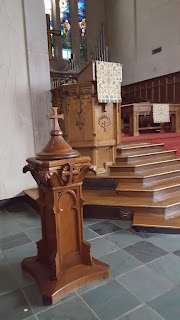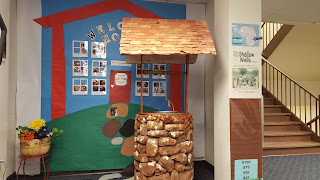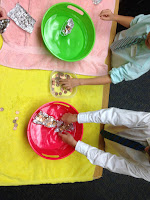 I was a Girl Scout in my early years, and yes a Brownie
before that; there weren’t Daisy Scouts
back then. Each meeting started with the Girl Scout Promise, “On my honor, I
will try…” That was probably my first
introduction to promises and promising.
There were many to follow. From
family commitments to childhood secrets we learn how to hold promises and make
them part of ourselves. Later, the college I attended had an honor code
requiring us to “pledge” every test and paper saying that “on my honor, I have
neither given nor received any unauthorized assistance on this test/paper.”
This pledge, or promise, was bound by a promise to live and to learn in a
particular way according to a particular set of guidelines for the community.
I was a Girl Scout in my early years, and yes a Brownie
before that; there weren’t Daisy Scouts
back then. Each meeting started with the Girl Scout Promise, “On my honor, I
will try…” That was probably my first
introduction to promises and promising.
There were many to follow. From
family commitments to childhood secrets we learn how to hold promises and make
them part of ourselves. Later, the college I attended had an honor code
requiring us to “pledge” every test and paper saying that “on my honor, I have
neither given nor received any unauthorized assistance on this test/paper.”
This pledge, or promise, was bound by a promise to live and to learn in a
particular way according to a particular set of guidelines for the community.  |
| Font, Word, and Table Second Presbyterian Church Indianapolis, IN |
Our lives as Christians begin with hope and a promise. Our parents hope for us, and pray for us.
More than likely, our church family does, too! Sometimes those hopes are
delayed or tempered, but we hope persistently.
Then promises are made at our baptism.
If we are very young, our parents and our church family make promises on
our behalf, while standing in the fountain of God’s Holy Promise, that we are a
Beloved Child of God. If we are older, we make these promises for
ourselves, but there are still church family promises to teach us, to visit us,
and to take care of us. There are
promises to care for us, to pray for us, to hope with us, and to walk with us
in the Holy Promise of being God’s family.
 As we grow, we make promises on our own about what we can
contribute to a project at school or the small jobs around our home. Ok, sometimes those are assigned, but we
promise we will do them! Those projects and jobs change as we grow and learn
new things. Our children are talking
about promises in Sunday School. It is a
wonderful time of learning what they have, what they can do, and how they can
be part of the promises to teach, to visit, to take care, to pray, to hope and
to walk. Our children are making promise
cards because we are a people of promise and they have gifts and talents and
time and resources to contribute. We
need them as an active part of God’s family!
Here at Second, children work in
the garden to provide food for the hungry.
Children encourage their families to help sort clothes for the
naked. Children and their families work
with their church- family- of- promise to visit with the homeless. The children live into the promise that has
been celebrated at their birth, at their baptism, and in the
daily/weekly/monthly/yearly living as part of the Holy Promise of being God’s
family here at Second Presbyterian Church, our Second Home.
As we grow, we make promises on our own about what we can
contribute to a project at school or the small jobs around our home. Ok, sometimes those are assigned, but we
promise we will do them! Those projects and jobs change as we grow and learn
new things. Our children are talking
about promises in Sunday School. It is a
wonderful time of learning what they have, what they can do, and how they can
be part of the promises to teach, to visit, to take care, to pray, to hope and
to walk. Our children are making promise
cards because we are a people of promise and they have gifts and talents and
time and resources to contribute. We
need them as an active part of God’s family!
Here at Second, children work in
the garden to provide food for the hungry.
Children encourage their families to help sort clothes for the
naked. Children and their families work
with their church- family- of- promise to visit with the homeless. The children live into the promise that has
been celebrated at their birth, at their baptism, and in the
daily/weekly/monthly/yearly living as part of the Holy Promise of being God’s
family here at Second Presbyterian Church, our Second Home. 
Comments
Post a Comment